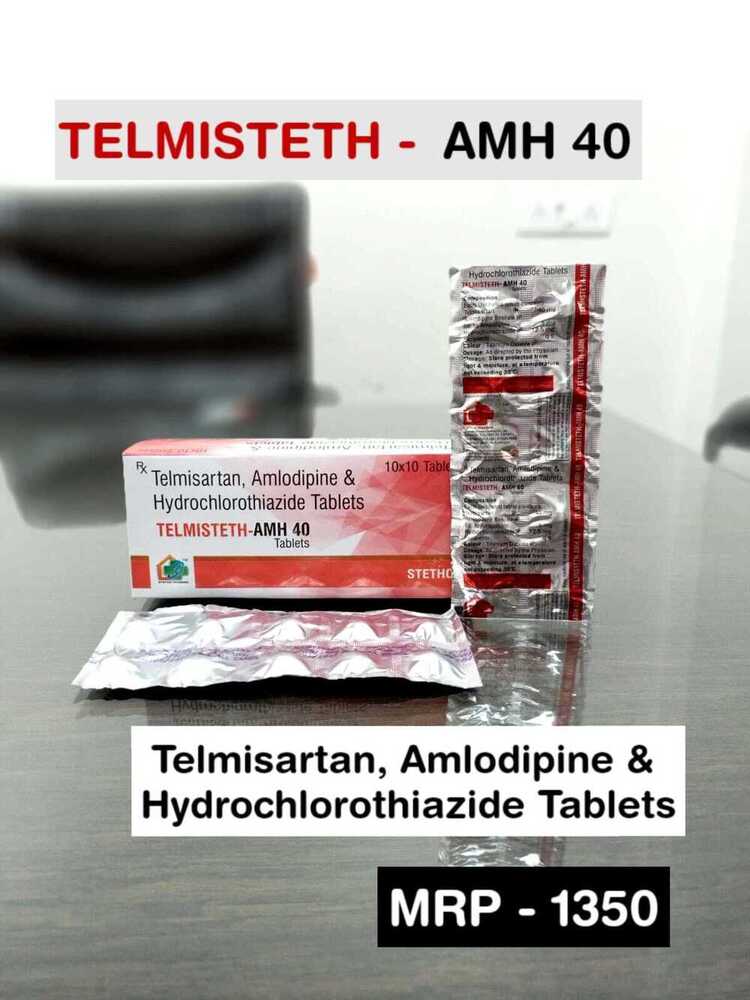Call us now
07971459530
Telmisartan an angiotensin II receptor blocker ARB
Amlodipine a calcium channel blocker CCB
Hydrochlorothiazide HCTZ a thiazide diuretic
Each one acts via a different mechanism so the combination tends to be more effective than any single drug alone especially in people whose blood pressure is not well controlled with simpler regimens PubMed4Apollo Pharmacy4mediboonpharmacom4
How they work Mechanisms of action
Heres how each component contributes
Component Mechanism
Telmisartan Blocks the angiotensin II type 1 AT1 receptors prevents angiotensin II a potent vasoconstrictor from acting causes vasodilation blood vessels relax reduces blood pressure Also reduces aldosterone secretion which means less watersalt retention TrueMeds2mediboonpharmacom2
Amlodipine Calcium channel blocker dihydropyridine class Inhibits calcium influx in vascular smooth muscle arteries leads to vasodilation reduces peripheral vascular resistance lowers blood pressure Also may have effects on heart but mostly for blood vessels TrueMeds1
Hydrochlorothiazide Diuretic that acts in the kidneys distal convoluted tubule to increase excretion of sodium and water reduces blood volume which helps lower blood pressure Also some effect in relaxing blood vessels in long term It also causes loss of some electrolytes like potassium and has effects on fluid balance Medicine India1
Indications When is it used
For people with hypertension especially when one or two medications are not enough to control blood pressure 1mg2PubMed2
When doctors want to combine different mechanisms ARB CCB diuretic to achieve better blood pressure lowering and possibly reduce risks of complications heart attack stroke kidney damage PubMed1
May be considered in patients with other risk factors like higher cardiovascular risk where good blood pressure control is very important
Common dosages
Some typical formulations or strengths used in the combined tablets are but these may vary by brand country patient
Telmisartan 40 mg or 80 mg cardiaticcarecom2indexarepositorycom2
Amlodipine usually 25 mg or 5 mg in these combos indexarepositorycom1
Hydrochlorothiazide often 125 mg per day when used as the third drug in combinations PubMed1
Clinical evidence
A study in Japanese patients whose blood pressure was not adequately controlled with telmisartan amlodipine showed that adding HCTZ 125 mg produced significantly greater reductions in both systolic and diastolic blood pressure after 8 weeks compared to continuing with just Telmisartan Amlodipine PubMed
Also in patients who were uncontrolled on amlodipine alone switching to telmisartan hydrochlorothiazide yielded better control PubMed
Potential benefits
Better blood pressure control vs fewer drugs
Lower risk of cardiovascular outcomes heart attack stroke if BP is well managed
May reduce risk of targetorgan damage kidneys heart associated with longterm high blood pressure
Using a triple combo may reduce pill burden if available as a single tablet and improve adherence
Risks Side effects
Like all medications there are possible side effects and specific risks to consider
Common side effects include
Dizziness lightheadedness especially on standing up Apollo Pharmacy2TrueMeds2
Swelling of ankles feet edema due primarily to amlodipine Apollo Pharmacy1
Fatigue feeling tired 1mg1
Nausea stomach upset Apollo Pharmacy1
Changes in electrolytes eg low potassium hypokalemia possibly low sodium HCTZ can also raise uric acid levels cardiaticcarecom2PubMed2
Possible increased risk of dehydration especially if fluid intake is low or with excessive sweating mediboonpharmacom1
Less common more serious risks
Kidney impairment especially if there is already existing kidney disease The ARB telmisartan can affect kidney function and diuretics alter fluid balance Monitoring is needed Apollo Pharmacy1
Electrolyte imbalances potassium sodium magnesium can lead to problems eg arrhythmias
Hypotension blood pressure going too low especially when first starting or increasing dose
Allergic reactions rare
For certain populations pregnancy severe hepatic disease etc might be contraindicated Apollo Pharmacy1
Precautions When it may not be suitable
Pregnancy Breastfeeding This combination especially telmisartan part is generally avoided during pregnancy because ARBs can cause harm to the fetus 1mg1
Kidney disease Existing impairment means closer monitoring is required
Electrolyte disturbances Patients with low potassium or who are taking other medications that affect electrolytes need caution
Liver disease Might require dose adjustments or avoidance
Other drug interactions Several possible interactions eg other blood pressure medicines potassiumsparing diuretics NSAIDs etc Apollo Pharmacy1
What to watch out for monitoring
If you are prescribed this combo doctors usually check advise
Regular blood pressure readings to ensure its effective but not too low
Kidney function tests creatinine blood urea periodically
Electrolyte levels potassium sodium especially with the diuretic
Signs of dehydration eg dry mouth excessive thirst low urine
Monitor for swelling sudden weight gain or shortness of breath
If you have gout since HCTZ can increase uric acid
Review all other medications supplements you are taking to avoid interactions


Price:
Price 70.0 INR / Box
Minimum Order Quantity : 10 Boxes
Recommended For : Hypertension, cardiovascular conditions
Physical Form : Other, Tablet
Dosage Guidelines : Take orally with or without food, as prescribed
Drug Type : Other, Prescription only
Price 75.0 INR / Strip
Minimum Order Quantity : 10 Strips
Recommended For : Treatment of Hypertension
Physical Form : Tablets
Dosage Guidelines : Take at the same time each day. Swallow the tablet whole with water.
Drug Type : Other, Allopathic
Price 110.0 INR / Box
Minimum Order Quantity : 100 Boxes
Recommended For : Type 2 Diabetes Mellitus
Physical Form : Tablets
Dosage Guidelines : Take orally with water, usually once daily with first main meal or as advised by doctor.
Drug Type : Other, Allopathic
Price 70.0 INR / Box
Minimum Order Quantity : 10 Boxes
Recommended For : Doctor
Physical Form : Tablets
Dosage Guidelines : As per Instructions
Drug Type : General Medicines
